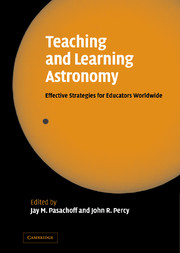Book contents
- Frontmatter
- Contents
- List of illustrations
- Preface
- Introduction
- Part I Astronomy in the curriculum around the world
- Part II Astronomy education research
- Part III Educating students
- Part IV Educating teachers
- Part V Astronomy and pseudoscience
- Introduction
- 12 Astronomy, pseudoscience and rational thinking
- 13 Astronomical pseudosciences in North America
- Part VI Astronomy and culture
- Part VII Astronomy in developing countries
- Part VIII Public outreach in astronomy
- Part IX The education programs of the International Astronomical Union
- Part X Conclusions
- Author index
- Subject index
12 - Astronomy, pseudoscience and rational thinking
Published online by Cambridge University Press: 18 May 2010
- Frontmatter
- Contents
- List of illustrations
- Preface
- Introduction
- Part I Astronomy in the curriculum around the world
- Part II Astronomy education research
- Part III Educating students
- Part IV Educating teachers
- Part V Astronomy and pseudoscience
- Introduction
- 12 Astronomy, pseudoscience and rational thinking
- 13 Astronomical pseudosciences in North America
- Part VI Astronomy and culture
- Part VII Astronomy in developing countries
- Part VIII Public outreach in astronomy
- Part IX The education programs of the International Astronomical Union
- Part X Conclusions
- Author index
- Subject index
Summary
Abstract: A strong case is made for including astronomy in the school science curriculum, as it encourages a scientific outlook. The realization that awesome natural phenomena can be explained in terms of known science can develop in students the habit of thinking rationally and help them counter superstitions that have traditionally taken root in society. A contrast with a pseudoscience like astrology will further help them to come to grips with the way real science functions.
Introduction
In 1944, three years before India became independent of British rule, Jawaharlal Nehru wrote in his now famous book Discovery of India:
The impact of science and the modern world have brought a greater appreciation of facts, a more critical faculty, a weighing of evidence, a refusal to accept tradition merely because it is tradition … But even today it is strange how we suddenly become overwhelmed by tradition, and the critical faculties of even intelligent men cease to function.
He then went on to express the hope that “Only when we are politically and economically free will the mind function normally and critically.” India became independent in 1947 with Nehru as the first Prime Minister, a post that he held for nearly 17 years. Ever an advocate of science and technology as the means of progress, he encouraged establishment of a good scientific infrastructure and also looked after achieving industrial growth. However, what has been the net outcome so far as human resources are concerned? Now we are well into the sixth decade after independence: where do we stand vis-à-vis Nehru's expectations of rational thinking?
- Type
- Chapter
- Information
- Teaching and Learning AstronomyEffective Strategies for Educators Worldwide, pp. 164 - 171Publisher: Cambridge University PressPrint publication year: 2005
- 1
- Cited by

